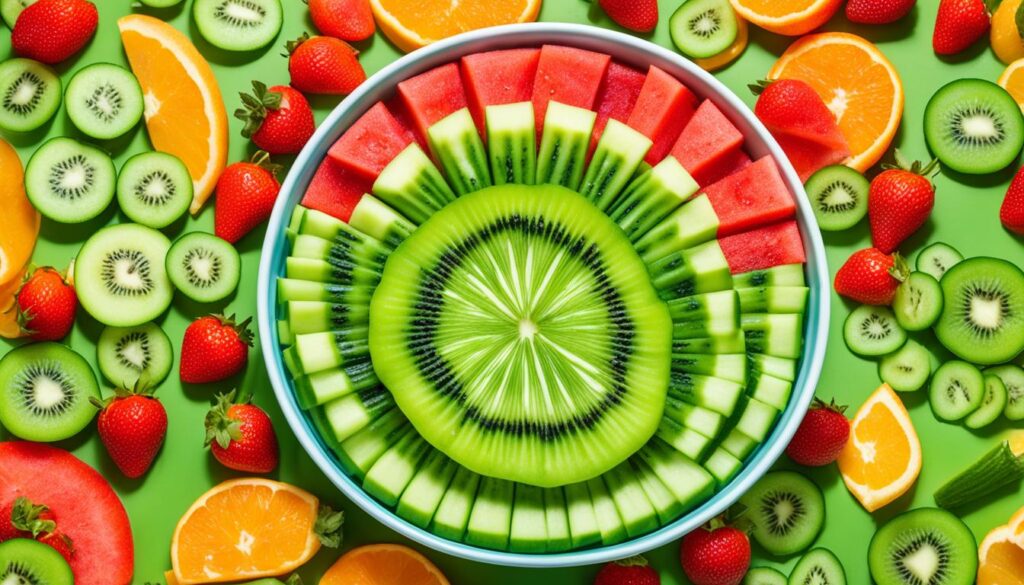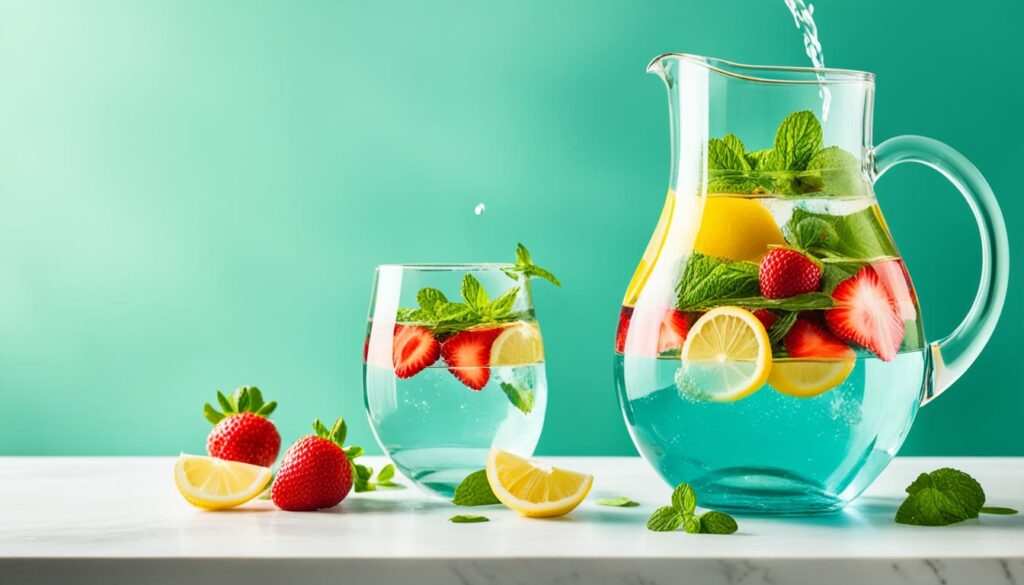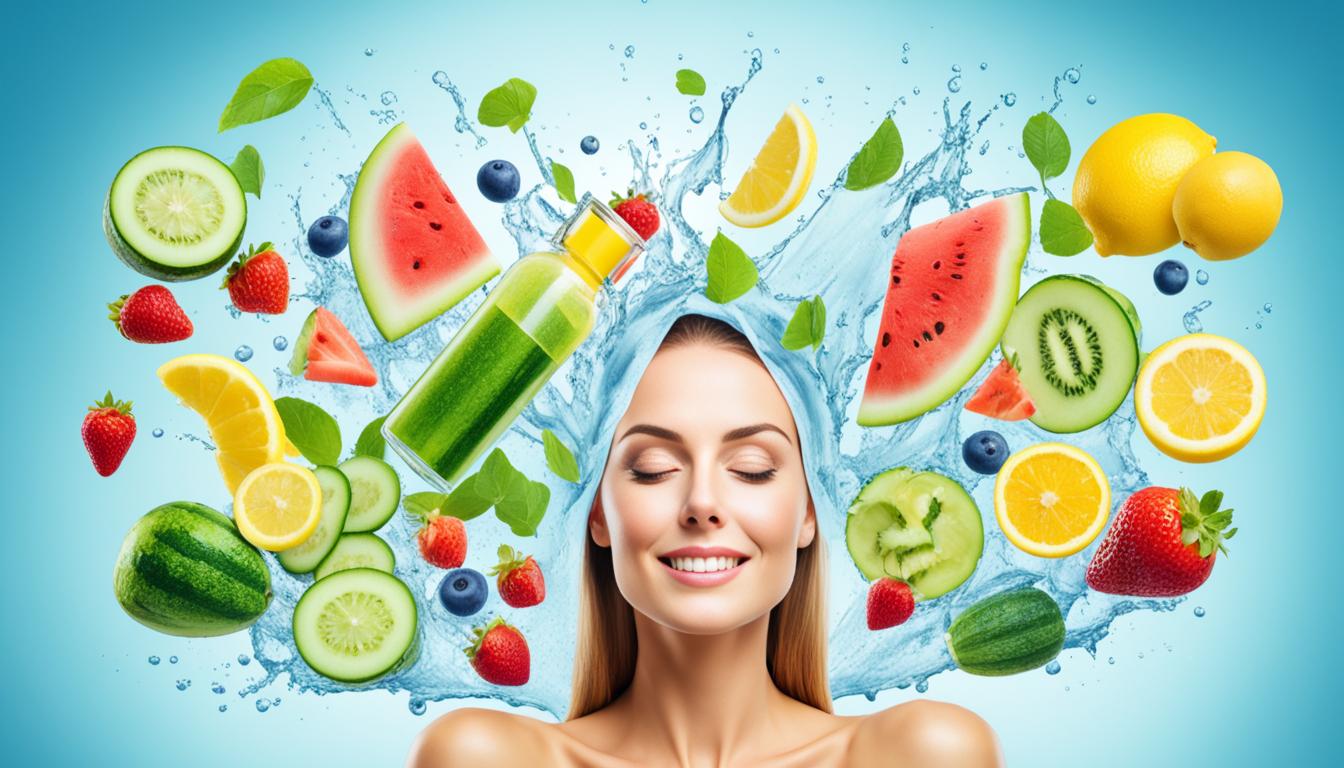Being hydrated keeps you healthy and feeling good. But, drinking plenty of water can also help you lose weight. When you drink more water, your body burns calories faster, makes you feel less hungry, and helps your stomach work better. Even a little bit of dehydration can make you moody, unfocused, and tired.
A water diet is good not just for keeping up electrolytes mixed in your body. It works well with things like fasting or detox for even better effects.
Studies show that just one glass of water can make your body work faster by 30% for about an hour. Overweight people who drank water before eating lost 40% more weight than others. And those who started drinking more water felt happier, more alive, and peaceful.
Drinking enough water not only helps with weight but also keeps your stomach moving smoothly. It stops constipation from happening by making sure you’re not a little dehydrated (even just 1%). This small step can make you feel better and think clearer.
Key Takeaways
- Drinking water can increase metabolism and aid in weight loss
- Adequate hydration improves mood, energy levels, and concentration
- Water diets help maintain electrolyte balance and support digestive health
- Combining water diets with intermittent fasting or detox plans can enhance results
- Staying hydrated is essential for overall physical and mental well-being
The Importance of Hydration
Keeping hydrated is key for good health. The CDC says we get water not only from drinks but also food. The amount of water a person needs is different for everyone. It depends on things like age, gender, and how active someone is.
How Much Fluid Do You Need?
How much water we need changes with our age and whether we are male or female. Adults are advised to drink 1.5–2 liters daily. That’s about 8-10 glasses. Men need more, aiming for 3.7 liters, while women should drink around 2.7 liters.
Kids drink about 6-8 glasses each day. Once they’re teenagers, their needs shift to what adults require.
About 80% of our needed water comes from drinks. Fruits and veggies help, too. Things like cucumbers and melons are mostly water. So, these can boost your water intake.
Factors Influencing Individual Hydration Needs
Many things affect how much water we should drink:
- Age and gender
- Body weight
- Climate and environmental conditions
- Activity levels and intensity of exercise
- Overall health status
- Pregnancy and breastfeeding
Athletes lose a lot of water while exercising. To recover, they often choose isotonic sports drinks. These not only rehydrate them but also replace lost salts.
Thirst increases in hot or high-altitude climates. Also, some conditions like pregnancy might require more water. In such cases, it’s important to keep a close eye on fluid intake.
| Age Group | Daily Fluid Intake |
|---|---|
| Children | 6-8 drinks (200 ml each) |
| Teenagers | 8-10 drinks (200 ml each) |
| Adult Men | 125 ounces (3.7 liters) |
| Adult Women | 90 ounces (2.7 liters) |
Urine color tells a lot about hydration levels. Light, pale urine shows you’re doing well on fluids. By being aware of your water needs, you can be healthier and feel better. Remember, staying hydrated is simple and vital.
Benefits of a Water Diet
A water diet involves drinking plenty of water and eating foods that hydrate you. It’s great for your health and feeling good. It can help with losing weight, make your digestion better, improve your mood, and boost energy. Water is crucial for your body to work its best.
Drinking water can help with weight loss. Having water before meals makes you feel full, so you eat less. This leads to eating fewer calories and losing weight. Water also increases your metabolism, helping you burn calories better. The CDC says this kind of weight loss is healthier and lasts longer than fast diets.
Being well-hydrated is important for your stomach. If your body lacks water, it might lead to stomach problems like constipation. Drinking water and eating fruits and veggies that hold water helps you go to the bathroom regularly. This keeps your stomach happy and healthy.
Hydration is key for how you feel and how much energy you have. Even just a little less water than you need can hurt your ability to think and stay focused. Drinking enough water helps you feel happy, less tired, and think clearly all day.
Research indicates that fasting can potentially benefit weight loss, hormone modulation, ketosis, autophagy, stress reduction and resistance, and inflammation reduction, among other aspects.
Detox water has fans who say it’s good for the immune system and skin. But remember, you get less nutrients this way than from eating whole fruits and veggies. Still, drinking water helps keep your skin moist. This is especially true if you are very dehydrated.
| Duration of Water Fast | Potential Benefits | Risks and Considerations |
|---|---|---|
| 24-72 hours | Weight loss, improved insulin and leptin sensitivity, lower triglyceride levels | Dehydration, loss of water, carbs, and some muscle mass |
| Longer, medically supervised fasts | Lower blood pressure, reduced inflammation, improved cholesterol levels | Not recommended without medical supervision, may worsen certain conditions like gout and eating disorders |
Water fasting needs care and maybe a doctor’s advice. It’s not for kids, older adults, pregnant or nursing women, or those with eating disorders. Most experts say fasts shouldn’t go over 24 hours. And it’s important to start eating again slowly to avoid problems.
In the end, adding a water diet to your life can bring many good things. It helps with weight loss, digestion, mood, and energy. Just keep hydrated and choose foods wisely. This will help your whole body be healthier and feel better.
How to Make Detox Water
Detox water is a tasty way to drink more water. It’s made with fruit, veggies, or herbs. You can pick the flavors you like and make it at home. This can be through recipes like lemon detox or by trying out your own mixtures. The best part is, it’s simple and enjoyable to do.
Simple Detox Water Recipes
Here are some easy and flavorful detox water ideas to try:
- Cucumber and mint
- Lemon and ginger
- Blackberry and orange
- Watermelon and mint
- Apple and cinnamon
To make detox water, just cut up your ingredients and add them to a pitcher with water. For colder drinks, let the mix sit in the fridge for 1-12 hours. Remember to take the fruits and veggies out to keep the water fresh.
Tips for Enhancing Flavor and Nutrient Content
To get the most out of your water, here are some tips:
- Squish the fruits and herbs before putting them in. This helps their flavors come out more.
- Use lots of colors in your mix to make it look good and be healthy.
- Experiment with different mixtures to find what you like best.
- Adding ingredients like cucumbers, ginger, and berries gives extra health benefits.
| Ingredient | Potential Benefits |
|---|---|
| Cucumbers | Rich in vitamins A and C, silica, and potassium |
| Ginger | Aids digestion, reduces gas, and has anti-inflammatory parts |
| Berries (blueberries, black raspberries) | Are powerful antioxidants |
| Aloe vera | Rich in many vitamins and minerals. It can help with skin, mood, digestion, and immunity. |
Detox water won’t detox your body in a big way. But, it’s a good choice over sugary drinks. It helps you drink more water and eat more fruits and veggies. This is great for staying hydrated and feeling good.
Incorporating Hydrating Foods into Your Diet
Drinking water is key for hydration. But, you can also get a lot of fluid from certain foods. By eating hydrating foods like fruits and veggies, you stay hydrated. Plus, you get a lot of good nutrients and tasty choices.

Water-Rich Fruits and Vegetables
Many fruits and veggies have a lot of water. This makes them great for getting extra fluids. Here are some top picks:
- Cucumbers (96% water)
- Lettuce (96% water)
- Celery (95% water)
- Zucchini (94% water)
- Watermelon (92% water)
- Bell peppers (92% water)
- Strawberries (91% water)
- Cantaloupe (90% water)
- Peaches (89% water)
- Oranges (88% water)
These foods give you fluids and are packed with vitamins, minerals, and fiber. They help keep you healthy.
Hydrating Meal Ideas
Adding these foods to your meals is an easy way to up your fluid intake. Here’s what you can make:
- Smoothies: Try blending watermelon, strawberries, or peaches. Add coconut water or skim milk for a tasty, hydrating drink.
- Salads: Mix lettuce, cucumbers, bell peppers, and other veggies. Add a light dressing for a healthy, hydrating meal.
- Soups: Have a cold gazpacho or a veggie-packed soup. Zucchini, celery, and tomatoes are great for staying hydrated.
- Popsicles: Freeze blended fruits like watermelon or strawberries for a fun, cool snack.
- Zucchini noodles: Swap pasta for zucchini noodles. Serve with tomato sauce for a meal that hydrates and satisfies.
| Food | Water Content | Additional Benefits |
|---|---|---|
| Watermelon | 92% | Low in calories, high in lycopene |
| Cucumbers | 96% | Low in calories, rich in vitamin K and potassium |
| Strawberries | 91% | High in fiber, vitamin C, and antioxidants |
| Zucchini | 94% | Low in calories, rich in vitamins and minerals |
Focus on including these foods every day. This helps meet your body’s need for hydration. Staying hydrated has lots of benefits.
Water Diet Hydration: Strategies for Success
Staying hydrated is crucial for good health and feeling well. A water diet helps meet your daily water needs. By adding simple steps to your day, you can stick to your hydration goals.
Setting Daily Water Intake Goals
Start a water diet by picking how much water you should drink. Amounts depend on your age, gender, and how active you are. Aiming for 8 glasses (64 ounces) a day is a good start. You can also aim for regular drink breaks to reach your goal more easily.
Tracking Your Progress
Keeping tabs on your water helps you stay on course. There are several ways to track your intake, such as:
- Use a water app on your phone.
- Keep a journal of how much you drink.
- Use a marked water bottle.
Regularly checking how much you drink helps spot trends and hit your goals.
Staying Motivated and Consistent
Keeping up your motivation and routine is crucial. Try these tips to keep going:
- Always have a water bottle with you.
- Use your phone or watch to remind you to drink.
- Swap out sugary drinks for water.
- Drink a glass of water before you eat to stay full and help lose weight.
| Hydration Level | Effects on Performance |
|---|---|
| 2% Dehydration | Less performance in long exercises. |
| Not Enough Water | Less muscle strength and endurance. |
| Being Dehydrated | 5.5% reduction in muscle strength (p |
Learning about how important water is and using these steps really works. They help you make a water diet part of your life. Plus, you reap the rewards of being well-hydrated.
Alternatives to Plain Water
Drinking plain water every day can be tough for some. There are fun ways to stay hydrated. A water filter cleans tap water, making it taste better by removing bad stuff. This is cheaper and greener than buying bottled water. You can also get a special water bottle that lets you infuse water with delicious natural flavors from fruits, veggies, and herbs.

Herbal Teas and Infusions
Herbal teas are great for staying hydrated and offer health benefits. Teas like chamomile and peppermint can calm your stomach, reduce stress, and help your immune system. Making a lot of herbal tea and keeping it cold means you have a refreshing drink always ready.
Low-Sugar Beverages
Not all drinks are good for staying hydrated, so be smart about what you pick. Coconut water and low-fat milk are good choices. Coconut water is excellent for hydrating because it’s full of natural electrolytes.
| Beverage | Hydration Benefits | Considerations |
|---|---|---|
| Cow’s Milk | Higher beverage hydration index (BHI) than water | Choose low-fat options |
| Soya Milk | Effective for rehydration after exercise | Check for added sugars |
| Coconut Water | High electrolyte content for rehydration | Limit consumption due to natural sugars |
| Coffee | Can contribute to daily fluid intake in moderation | Limit to less than four cups per day |
| Herbal Teas | Caffeine-free hydration with additional health benefits | Avoid adding sugar or honey |
Consider juices and soups for more low-sugar options. But limit juices to 150ml a day because they’re high in sugar. Soups are a great choice after exercise. They have lots of water and sodium, which helps keep you hydrated.
Too much salt is no good, though. Grown-ups should have less than 6g of it each day.
“Staying hydrated is crucial for maintaining overall health and well-being. By incorporating a variety of hydrating beverages and being mindful of added sugars and artificial sweeteners, you can ensure that you’re meeting your daily fluid needs in a tasty and nutritious way.”
Conclusion
Staying hydrated is key to good health and feeling well. Almost four in ten people don’t drink enough water according to European Health Agencies. To get enough water, drink water, eat fruits and veggies, and choose what you drink wisely. While detox water isn’t magic, it makes water more exciting and helps you eat more hydrating foods.
It’s smart to set your own water-drinking goals and keep track. Use a cool water bottle or set phone reminders to help. Drinking more water links to eating better and moving more. To drink healthy, swap out sweet drinks for water, teas, and drinks with less sugar. Remember, how much water you need depends on age, where you live, and how active you are.
Following these tips will help you drink more water and feel its benefits. Better weight, sharper mind, and more power are some pluses of drinking enough water. Try and enjoy the benefits of drinking the right amount of water every day. It’s a simple step for a healthier and more enjoyable life.




